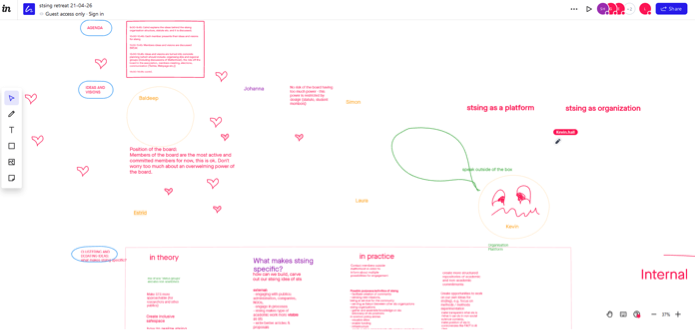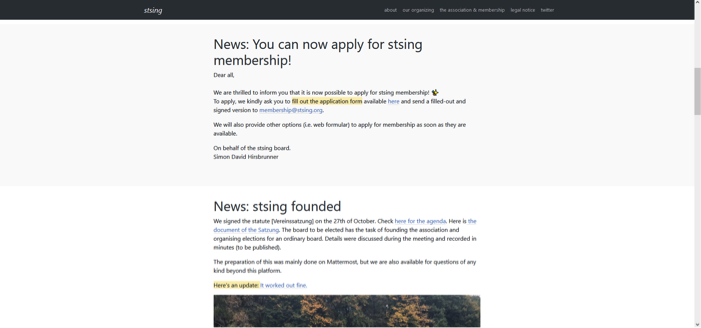How could it take four years? When the first general assembly of stsing will take place on 10 September 2021, four years will have passed since the first ideas of (re)organising STS in Germany emerged over two cappuccinos and an Americano. Covid-19 is a good excuse, as is German bureaucracy. But they are not the only reasons. Once, when one of us first told him about STS, a math professor and research-collaborator exclaimed “you seem to complexify things; isn’t science about making problems simple and easy to solve”? He had gotten a good sense of STS.
The STS community in Germany does not make it easy for itself to create an association. As is often the case in STS, we seem not just to want to provide innovative results; we also want to intervene into the mode of producing results. In Germany, a part of the STS community wants to organise itself differently from how academic societies traditionally organise. It wants more of a dynamic platform that empowers young scholars and less of a society safeguarded by established colleagues. It desires more facilitation of new ideas and less emphasis on tradition. It urges for more decentralized and unpredictable activities and less ceremonial events. It seeks to embrace linguistic cosmopolitanism while also supporting local forms of communication. It wishes to be inclusive while also having norms about how (not) to treat each other. It aspires for co-laboration with non-academics, while sticking to high intellectual standards. It is critical of scholastic conventions but insists on engaging with the socio-material constraints of universities as workplaces.
Plans
In view of these ambitious intentions the device chosen for infrastructuring the community may seem hopelessly antiquated: the “Verein” organisational form. This German association entails among others a statute, clearly defined (non-)members, general assemblies with fixed agendas, and a board. The task at hand was to mobilise these rigid structures for our visions of fluid, caring, and co-laborative processes. We (obviously many more than the authors of this text) studied how activist organisations had solved this problem before us, and agreed on the observation that the flexibility and care we sought to nurture would flourish best in smaller autonomous groups. We envisioned independent workgroups to be the core organs of the associations: project groups sharing research on particular topics, event groups planning conferences or workshops, interest groups discussing STS teaching, peer-support groups helping each other with research applications and publications, etc.
However, such a decentralized structure is likely at risk of fragmentation, and thus integrative devices had to be invented. Four devices were conceived that should provide this:
- a shared communication platform, which would allow all members a window into what happened in the other workgroups, and also ease access for newcomers,
- a reporting system which would require of workgroups to regularly sum up and inform about their activities,
- an organ that would collect the workgroups’ reports and communicate them back to the community and to external observers, and
- informal regional groups in which members across the specialised workgroups would meet and mingle.
Members of the workgroups would be likely to come from all over the country (and probably from abroad as well), and maybe even primarily meet online. This could make it difficult for newcomers to join and it could easily end up formalising interaction, which was thought to likely obstruct creativity, and indeed care. The regional groups should enable members to meet up across the workgroup and to exchange their activities, experiences and ideas more informally than through reporting.
Each of the four devices turned out to be controversial. Very much so the question of the collectors workgroup reports. These were originally thought of a foresters or caretakers who should consider themselves as servants of the workgroups rather than their editors or regulators. The formal organ that was available for this task in the “Verein” organisational form was the board. Voices critiqued naming the board “foresters” or “caretakers”, as this would conceal the power granted to them. What a dilemma! How do you redefine, and disempower a formally powerful organ, when renaming it at the same time conceals its power? How strong or how weak is the performativity of a name? The question will have to be answered in another context, since we reacted to the critique by refraining from renaming the board.
Situated action
This infrastructure was a “Kopfgeburt” (head birth) that still is in the process of being turned into real bodies, relations and events. On 27 October 2020 ten people gathered in the central Berlin part Tiergarten to found the association; with distance and outside to avoid Sars-Cov2 contagion. A board of seven people was elected, and the work of turning the conceived infrastructure into lived reality began. A seemingly endless number of trivial formal decisions were to be made, which in the interaction among STS scholars all become political: from the question of which data to collect on the membership form to how to store membership data securely, which lawyer to choose for the registering of the association, whether and in what form to add an anti-discrimination statement in the statute, how to address workgroups in order to perform the desired role of the board, how to secure that not only men are working on the technical infrastructure, etc., etc.

Parallel to the board busy infrastructing stsing, another group is working on the inaugural conference, which due to the SARS-Cov2 pandemic had to be postponed and hopefully will take place on 20-21 May 2022 in Paderborn, with and exciting experimental programme. Yet other people have taken contact to the German Research Foundation to initiate a discussion of how STS research applications are best handled in a highly disciplinary funding landscape. Some scholars gather to develop a concept of how to ensure stsing engagements to be anti-discriminative. Other colleagues organise the technical infrastructure and the online elections for the next board, etc.
STS beyond stsing
While stsing is currently quite occupied with its own internal infrastructuring, its founding has also had effects on the larger landscape of STS in Germany. The Gesellschaft für Wissenschafts- und Technikforschung (GWTF) has existed since the EASST conference in Bielefeld in 1987, just as many other organisations and networks exist that are concerned with technology assessment, politics of technology, philosophy of science and philosophy of technology, the needs of young STS scholars, etc. Due to the abundance and well-established scholarly organisations in Germany dealing with science and technology, voices arose inquiring if what we need is really yet another association? This led to intense debates, but the shared wish to embrace diversity and abundance of STS in Germany has resulted in an initiative to bring all these heterogeneous networks and organisations together, many of whom had prior not been aware of each other’s existence. Both in 2019 and in 2020 meetings were organised for all the STS groups in Germany, and at the moment a group is organising a larger joint conference in the autumn of 2022 for all the German STS networks.
Nicely troubling
Writing this short report, we realize that a lot has happened over the past four years. Much has unfolded in smaller groups, such as the board convening online every other week. With the view to the upcoming first general assembly on 10 September, we expect stsing activities to be more publicly visible and engaging. The first general assembly will have public online keynotes and take place as a distributed event in smaller local “hubs” all over the country. We are looking forward to seeing STS colleagues gathering locally while sharing this collective event. It is exciting to be part of organising a community that does not shy away from neither complexity nor trouble and where there always seems to be someone, who has yet a better idea, or who point to yet another problematic implication of the latest decision. We feel confident that by cultivating response-ability to these many voices, stsing will indeed keep mobilising the German STS community in a lively, productive and nicely troubling way.
Anyone is warmly invited to join the infrastructuring endeavour; the discussions, complications, transformations, and indeed the celebrations that make stsing happen. Membership is open to all. It starts here: https://stsing.org/
